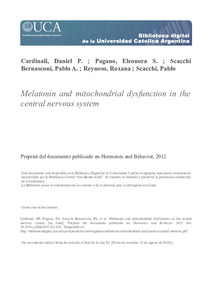Por favor, use este identificador para citar o enlazar este ítem:
https://repositorio.uca.edu.ar/handle/123456789/1632| Título: | Melatonin and mitochondrial dysfunction in the central nervous system | Autor: | Cardinali, Daniel Pedro Pagano, Eleonora S. Scacchi Bernasconi, Pablo A. Reynoso, Roxana Scacchi, Pablo |
Palabras clave: | MELATONINA; MITOCONDRIAS; SISTEMA NERVIOSO CENTRAL; RADICALES LIBRES; ENVEJECIMIENTO; STRESS; ENFERMEDAD DE ALZHEIMER; ENFERMEDAD DE HUNTINGTON; ENFERMEDAD DE PARKINSON | Fecha de publicación: | 2012 | Editorial: | Elsevier | Cita: | Cardinali D. P., et al. Melatonin and mitochondrial dysfunction in the central nervous system [en línea]. Hormones and Behavior. 2013, 63 (2). doi:10.1016/j.yhbeh.2012.02.020. Disponible en: https://repositorio.uca.edu.ar/handle/123456789/1632 | Resumen: | Abstract: Cell death and survival are critical events for neurodegeneration, mitochondria being increasingly seen as important determinants of both. Mitochondrial dysfunction is considered a major causative factor in Alzheimer’s disease (AD), Parkinson’s disease (PD) and Huntington’s disease (HD). Increased free radical generation, enhanced mitochondrial inducible nitric oxide (NO) synthase activity and NO production, and disrupted electron transport system and mitochondrial permeability transition, have all been involved in impaired mitochondrial function. Melatonin, the major secretory product of the pineal gland, is an antioxidant and an effective protector of mitochondrial bioenergetic function. Both in vitro and in vivo, melatonin was effective to prevent oxidative stress/nitrosative stress-induced mitochondrial dysfunction seen in experimental models of AD, PD and HD. These effects are seen at doses 2-3 orders of magnitude higher than those required to affect sleep and circadian rhythms, both conspicuous targets of melatonin action. Melatonin is selectively taken up by mitochondria, a function not shared by other antioxidants. A limited number of clinical studies indicate that melatonin can improve sleep and circadian rhythm disruption in PD and AD patients. More recently, attention has been focused on the development of potent melatonin analogs with prolonged effects which were employed in clinical trials in sleep-disturbed or depressed patients in doses considerably higher than those employed for melatonin. In view that the relative potencies of the analogs are higher than that of the natural compound, clinical trials employing melatonin in the range of 50-100 mg/day are needed to assess its therapeutic validity in neurodegenerative disorders. | URI: | https://repositorio.uca.edu.ar/handle/123456789/1632 | ISSN: | 0018-506X | Disciplina: | MEDICINA | DOI: | 10.1016/j.yhbeh.2012.02.020 | Derechos: | Acceso Abierto | Fuente: | Hormones and Behavior. 2013, 63 (2) |
| Aparece en las colecciones: | Artículos |
Ficheros en este ítem:
| Fichero | Descripción | Tamaño | Formato | |
|---|---|---|---|---|
| melatonin-mitochondrial-dysfunction-central-nervous.pdf | 394,88 kB | Adobe PDF |  Visualizar/Abrir |
Visualizaciones de página(s)
228
comprobado en 30-abr-2024
Descarga(s)
642
comprobado en 30-abr-2024
Google ScholarTM
Ver en Google Scholar
Altmetric
Altmetric
Este ítem está sujeto a una Licencia Creative Commons

